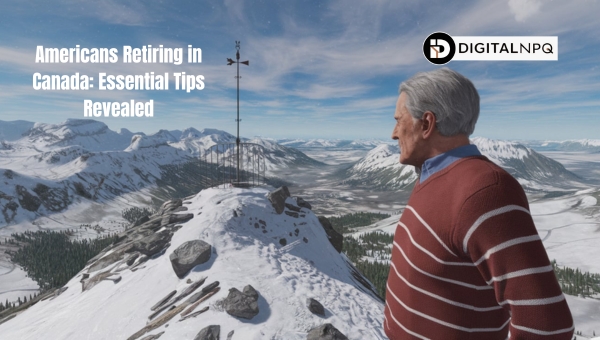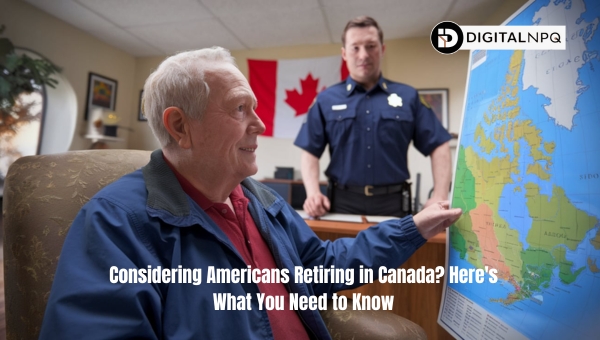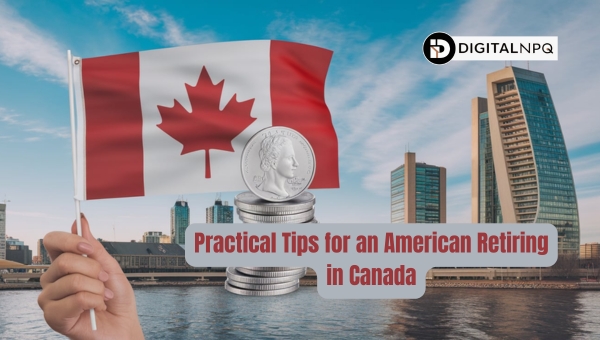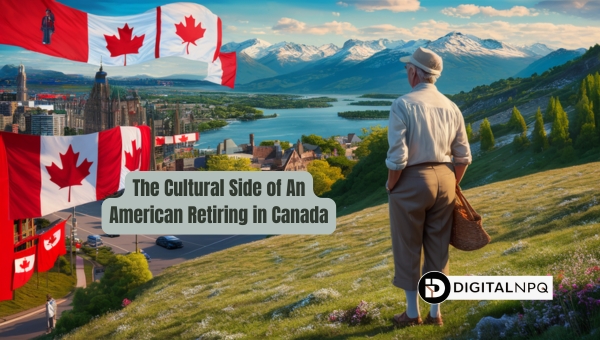Americans Retiring in Canada: Beat Boredom with This Move!

If you’re considering an international retirement destination, Americans Retiring in Canada offers a unique blend of benefits. This article dives into the legal framework, financial considerations, housing options, and the Canadian healthcare system, ensuring a comprehensive understanding.
We’ll also explore the cultural nuances and potential challenges for retirees. Ready to embark on this journey? Let’s ensure you’re well-prepared for a seamless transition to your new life in Canada.
Considering Americans Retiring in Canada? Here’s What You Need to Know
Are you an American thinking about spending your retirement years in Canada? Many Americans are drawn to Canada for its beautiful landscapes, friendly communities, and quality of life.

However, there are several factors to consider before making the move. You’ll need to understand the legal requirements, the Canadian retirement system, and more. Let’s delve into the details to help you make an informed decision.
Legal Framework for Americans Retiring in Canada
Navigating the legal landscape is a crucial step for Americans wanting to retire in Canada. Here are some key points to consider:
- Visa Requirements: The most common options are the Super Visa for parents and grandparents, which allows multiple entries for up to five years, or applying for permanent residence through programs like the Federal Skilled Worker Program or Family Class sponsorship.
- Social Insurance Number (SIN): Once you arrive in Canada, you’ll need to apply for a SIN. This number is essential for employment, government benefits, and tax purposes.
- Tax Obligations: You’ll be required to file Canadian income tax returns annually, even if you have no income in Canada. Understanding the tax implications on both sides of the border is vital to avoid surprises.
- Healthcare Access: Confirm the healthcare coverage you’ll be eligible for, especially during the initial period before you qualify for provincial healthcare.
Understanding the Canadian Retirement System
The Canadian retirement system offers several benefits, but it’s different from what you might be used to in the U.S. Here’s what you should know:
- Old Age Security (OAS): This is a basic pension available to seniors aged 65 and older who have lived in Canada for at least 10 years.
- Canada Pension Plan (CPP): This plan provides a monthly retirement pension based on your contributions while working in Canada. If you’ve worked in Canada and contributed to the CPP, you may be eligible for these benefits.
- Healthcare Insurance: Canada offers publicly funded healthcare, but it doesn’t cover everything. Prescription drugs, dental care, and vision care are not covered under the basic plan, so you may need additional insurance.
- Supplementary Benefits: Depending on the province, there could be additional benefits for seniors, such as subsidized prescription drugs or other healthcare services.
Understanding these elements will help you prepare for a smooth transition into your new life in Canada.
Also Read: Canada Revenue Agency Login: Quick Guide to Access Services
Practical Tips for an American Retiring in Canada
Are you an American considering retiring in Canada? There are several practical aspects to think about to ensure a smooth transition. From managing your finances to finding the perfect home, we’ve got you covered. Let’s dive into some essential tips that will help make your retirement in Canada enjoyable and hassle-free.

Financial Considerations
When retiring in Canada, there are several financial factors to keep in mind. Here are the key points you should consider:
- Taxation: Canada has a progressive tax system. It’s important to understand how your income will be taxed both in Canada and the U.S.
- Cost of Living: The cost of living can vary widely depending on the region. Cities like Toronto and Vancouver are more expensive, while smaller towns may offer a more affordable lifestyle.
- Exchange Rates: Keep an eye on currency exchange rates, as fluctuations can impact your retirement savings when converting U.S. dollars to Canadian dollars.
- Healthcare Costs: While Canada has a public healthcare system, some services like dental and vision care are not covered. Make sure to budget for these additional expenses.
- Pension Plans: Understand how your U.S. social security benefits will interact with Canadian pension plans.
Housing and Accommodation
Finding the right place to live is crucial for a comfortable retirement. Here are some tips on housing and accommodation:
- Buying vs. Renting: Decide whether buying a home or renting is the best option for you. Each has its advantages and disadvantages.
- Best Places to Live: Consider popular retirement destinations such as Vancouver Island, the Okanagan Valley, and the Eastern Townships. These areas offer beautiful scenery and a range of amenities.
- Proximity to Amenities: Ensure your chosen location is close to healthcare facilities, shopping centers, and recreational activities.
- Community Living: Look into retirement communities that offer social activities and support services. This can be a great way to make new friends and stay active.
- Climate: Be mindful of the climate in different regions. Some areas have harsh winters, while others offer milder weather.
By carefully considering these financial and housing aspects, you can set yourself up for a fulfilling and stress-free retirement in Canada.
The Cultural Side of An American Retiring in Canada
Transitioning to life in Canada can be an exciting adventure for American retirees. Canada offers a unique blend of cultural experiences that may differ from what you’re used to in the United States.

Adjusting to these new surroundings can enrich your retirement years. Let’s dive into what you need to know about embracing Canadian culture and the challenges you may face.
Embracing Canadian Culture
Adjusting to Canadian culture involves understanding and appreciating its rich diversity and unique customs.
Here are some key aspects to consider:
- Multiculturalism: Canada is known for its multicultural society. You’ll find a blend of cultures, languages, and traditions. This diversity is celebrated through numerous festivals and community events.
- Social Norms: Canadians are generally polite and value respect and courtesy. Simple gestures like saying “”please”” and “”thank you”” go a long way.
- Indigenous Heritage: Learning about the Indigenous peoples of Canada and their traditions is crucial. Many communities host events that showcase Indigenous art, music, and history.
- National Pastimes: Hockey is more than just a sport in Canada—it’s a national pastime. Attending a local game or even participating in winter sports can be a fun way to integrate.
- Cuisine: Don’t miss out on trying Canadian culinary delights like poutine, butter tarts, and, of course, maple syrup.
Challenges Americans May Face When Retiring in Canada
While the cultural transition can be a rewarding experience, there are challenges that Americans might encounter:
- Metric System: Canada uses the metric system, which means you’ll need to get used to measuring distances in kilometers and temperatures in Celsius.
- Healthcare System Differences: Canada’s healthcare system is publicly funded and may operate differently from what you’re used to. It’s important to understand how to access and navigate this system.
- Language Barriers: While English is widely spoken, Quebec and some other regions primarily use French. Learning some basic French phrases can be helpful.
- Weather Adaptation: Canadian winters can be harsh, especially if you’re moving from a warmer climate. Investing in quality winter gear is essential.
- Cost of Living Variations: The cost of living can vary significantly depending on the region. Urban areas like Toronto and Vancouver are more expensive compared to smaller towns.
Adjusting to life in Canada as an American retiree involves both embracing new cultural experiences and navigating potential challenges. By preparing for these aspects, you can make your transition smoother and enjoy all that Canada has to offer.
Healthcare Considerations for An American Retiring In Canada
Thinking about retiring in Canada? Understanding the healthcare system is crucial for a smooth transition. We’ve got you covered with essential insights into how the Canadian healthcare system works, especially for seniors, and how to access medical care as an expatriate.
Understanding the Healthcare System
Canada’s healthcare system, known as Medicare, ensures that all residents have access to medically necessary services.
Here’s a breakdown of how it works for seniors:
- Universal Coverage: Medicare provides coverage for hospital and physician services, ensuring that seniors receive the care they need without direct charges.
- Provincial Plans: Each province and territory administers its healthcare plan, meaning the specifics of coverage can vary.
- Additional Benefits: Some provinces offer additional benefits for seniors, such as subsidized prescription drugs and home care services.
- Enrollment: Upon becoming a resident, you must enroll in the provincial healthcare plan. This process can take up to three months, so having interim private insurance is wise.
- No Coverage for Certain Services: Services like dental care, vision care, and prescription drugs are not covered by Medicare, and seniors may need additional private insurance for these.
Accessing Medical Care as an Expatriate
As an American retiree, accessing medical care in Canada involves a few key steps. Here’s what you need to know:
- Provincial Healthcare Registration: Once you become a resident, register for provincial healthcare. This usually involves providing proof of residency and identity.
- Health Card: After registration, you’ll receive a health card, which you’ll need to present whenever you access medical services.
- Waiting Period: Be aware of the potential waiting period for coverage to kick in. During this time, it’s essential to have private health insurance to cover any medical needs.
- Private Insurance: Consider maintaining or obtaining private insurance to cover services not included in Medicare, such as dental, vision, and prescription drugs.
- Access to Doctors: Finding a family doctor can be challenging due to high demand. It’s advisable to start your search early and be prepared for wait times.
Retiring in Canada offers many benefits, but understanding the ins and outs of the healthcare system is essential for a seamless experience. With these tips, you’ll be well-prepared to navigate your healthcare needs as an expatriate.
Also Read: CTC Payments 2024: Maximize Your Child Tax Credit
Checklist: Before you make a Decision of ‘American Retiring In Canada’
Thinking about retiring in Canada? There’s a lot to consider before making the move. From understanding legalities to managing finances, it’s crucial to be well-prepared. This checklist will guide you through the essential preparations needed for a smooth transition.
Essential Preparations
Before you pack your bags and head north, ensure you have these key elements in place:
- Obtain the right visa or permanent residency: Start by researching the appropriate visa options. The Super Visa or permanent residency through programs like Family Class sponsorship are common choices.
- Apply for a Social Insurance Number (SIN): This is essential for accessing government services, working, and filing taxes in Canada.
- Understand tax obligations: Both the U.S. and Canada have tax requirements. It’s important to know your responsibilities to avoid complications later.
- Research cost of living and housing options: Costs can vary greatly across Canada. Look into housing options like buying versus renting and consider the best places to retire.
- Familiarize yourself with the healthcare system: Canada’s healthcare system is different from the U.S. Ensure you understand what is covered and consider obtaining private health insurance during the initial waiting period.
- Manage U.S. assets and finances: Decide how to handle your U.S. bank accounts, investments, and other assets. This might involve consulting with a financial advisor.
- Consider dual citizenship rights and responsibilities: Understand the implications of holding dual citizenship, including the benefits and potential drawbacks.
By checking off these preparations, you’ll be well on your way to enjoying a fulfilling retirement in Canada.
FAQs
What visas are available for an ‘American retiring in Canada’?
There are a few options available. The Super Visa allows parents and grandparents to stay for up to 5 years. Permanent residence can also be gained through programs like the Federal Skilled Worker Program or Family Class sponsorship.
How does public health insurance work for retirees moving from America?
Canada’s Medicare offers universal coverage for essential medical services. However, new residents may need up to 3 months to register for provincial healthcare, during which private health insurance is advisable.
What are some recommended places suitable for retirees?
Popular spots for retirees include Vancouver Island, the Okanagan Valley, and the Eastern Townships. These regions offer a blend of natural beauty, amenities, and community services ideal for retirees.
Conclusion
In summary, retiring in Canada as an American can be a fulfilling experience if you plan carefully. From understanding the legal framework and financial implications to embracing the cultural nuances, there are many factors to consider. The Canadian healthcare system and retirement benefits offer a high standard of living for retirees. By following the tips and guidelines provided, you can ensure a smooth transition and enjoy your golden years in Canada.
If you found this guide helpful, don’t miss out on more insightful tips and information. Explore our other blogs to continue learning!
